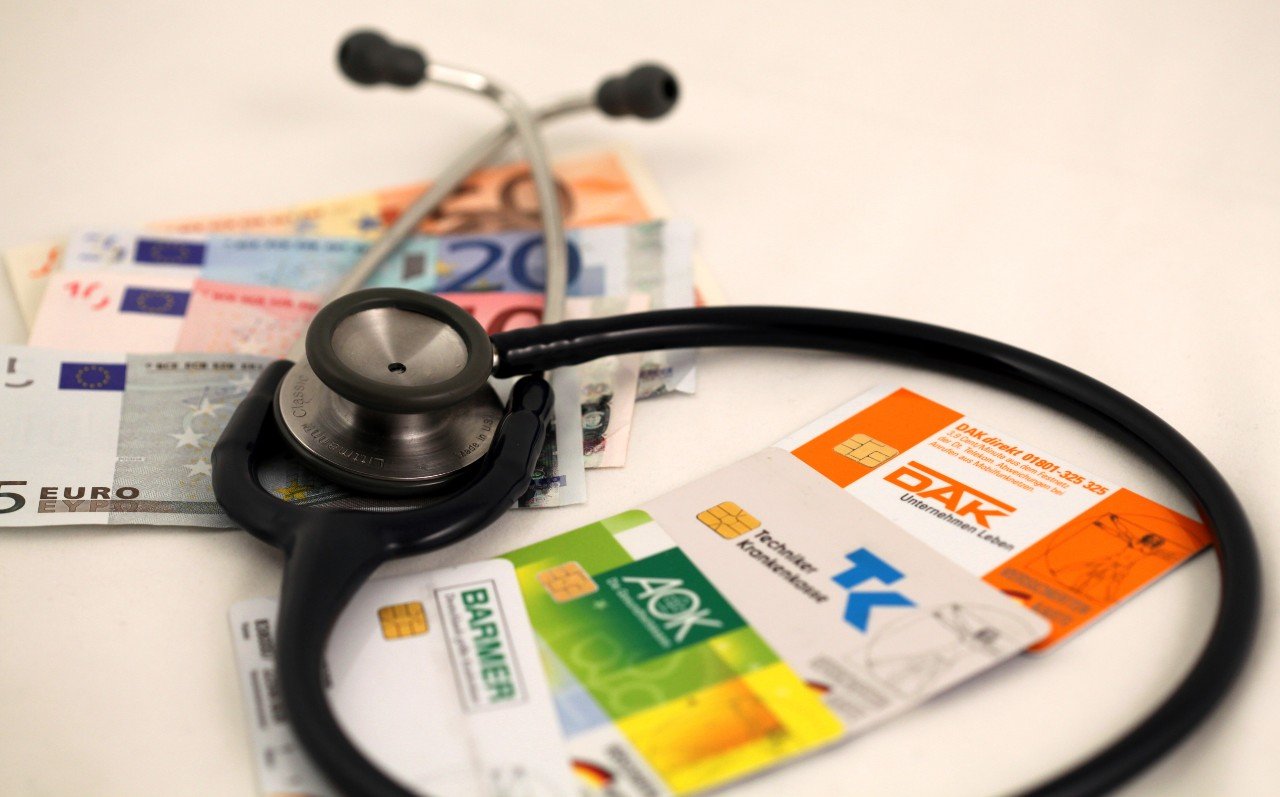KSK: How creative freelancers can pay less for German health insurance

If you’re self-employed in Germany, your health insurance costs twice as much and you might end up forgoing things like unemployment benefits or pension insurance. But creative freelancers have a way to access all these benefits like any other employed person.
Germany’s entire social insurance model is based on the sharing of costs between the government, employers, and employees.
Contributions for everything from unemployment to health insurance to pensions are calculated based on income, with the costs being split between employer and employee and the government topping up health and pension insurance funds as needed.
But obviously, such a model disadvantages the self-employed by requiring them to pay both employee and employer shares – making social insurance particularly expensive for people who work for themselves.
Everyone has to have health insurance in Germany, but freelancers aren’t required to pay into unemployment or state pension. Due to the high health insurance costs, this often leads to a situation where people simply opt out of unemployment and state pension schemes altogether – leaving them unprotected by a large part of the German social safety net.
With people working in the artistic professions often not pulling in the incomes other self-employed business owners take in, Germany’s artist social insurance fund, or Künstlersozialkasse (KSK), exists to provide artistic freelancers with an affordable way into Germany’s social insurance system.
READ ALSO: Everything you need to know about becoming a freelancer in Germany
What is the KSK and how does it work?
The KSK, based in Wilhelmshaven, collects mandatory levies from institutions in Germany that employ a lot of creative freelancers. These can include art galleries, photo studios, opera houses, newspapers, magazines, and theatres – just to name a few. The German government then complements this revenue by topping up the KSK.
Using this pot of money, the KSK then basically fills the role of an 'employer' by paying half of the freelancer's social security contributions.
Every year, a creative freelancer will send an estimate of the amount of money they think they’ll make the following year - with the safest bet being to analyse what you made the year before or look at the contracts you have lined up for the year coming.
Word of warning, however: it's often best to give a conservative estimate of your future earnings as you can always update it at a later date, but the KSK won't refund any over-payments you made.

The insurance cards of the health insurance companies DAK, AOK, Barmer and Techniker-Krankenkasse TK lie with euro notes under a stethoscope. KSK membership will allow artistic freelancers access to cheaper public health insurance. Photo: picture alliance / dpa | Daniel Karmann
Based on that amount, the KSK will calculate a monthly contribution amount that it will automatically debit from your account every month. They’ll calculate this exactly the same way as if they were employing you – so the contribution you make to them will cover your health insurance, pension payment, long-term care insurance, and contribution to your unemployment insurance.
READ ALSO: How long do you have to work to receive a German pension?
What benefits does a KSK member have? How are they protected?
Your contributions mean that if you have to shut down your business at any point – perhaps due to a downturn that has hit creative sectors hard – you can claim unemployment insurance, or ALG I, a year after paying into them, just the same way any other employee in Germany would.
Once you’ve paid into the German pension system – even through KSK – for five years, you’ll be eligible for a pension the same way any other employee in Germany would be eligible.
Finally, you have much better access to health insurance benefits.
While you can’t call in sick for a day or two and have your pay covered the way a regular employee would, you can still receive sick pay if you’re off for longer than six weeks. Some public health insurances also offer extra options where the entitlement to sick pay for KSK members kicks in at two weeks rather than six – providing a much bigger cushion from lost revenue than other freelancers would have.
Future mothers can also get their maternity leave covered through the KSK.
Furthermore, membership in the KSK gives you an entitlement to public health insurance of your choice, whereas public health insurances can technically turn other types of freelancers down if they want to.
EXPLAINED: What happens if you’re off sick for a long time in Germany
Who is eligible for membership in the KSK?
KSK membership is limited to freelancers who work in artistic professions. However, these can have a broad definition.
There are four overarching categories for freelancers who are eligible for KSK membership: writers, performing artists, visual art & design, and music.
 A musician of the Hamburg Symphony Orchestra rehearses the Beethoven Symphony No. 3 during a dress rehearsal in the Great Hall at the Laeiszhalle. Musicians can also be covered under Germany's artist social insurance fund. Photo: picture alliance/dpa | Marcus Brandt
A musician of the Hamburg Symphony Orchestra rehearses the Beethoven Symphony No. 3 during a dress rehearsal in the Great Hall at the Laeiszhalle. Musicians can also be covered under Germany's artist social insurance fund. Photo: picture alliance/dpa | Marcus Brandt
Covered writers include journalists, copywriters authors, editors, and even self-employed public relations professionals. Covered artists include painters, photographers, graphic designers, and even game designers. Performing artists who can apply include actors, dancers, moderators, puppeteers, drag performers, circus performers, choreographers, camera operators, and visual editors.
Meanwhile, accepted musicians can include singers, music teachers, those who play their own instruments, and even DJs.
When first applying for the KSK, prospective members will have to indicate which one they are and provide some proof.
READ ALSO: 10 golden rules to know if you lose your job in Germany
How do you apply for KSK?
You can start your KSK application at an online link here.
Besides filling in the form with your category of work and estimated yearly revenue, you’ll need to provide some career history, along with proof of what you do.
For established freelancers, this proof is a little easier. You can send in invoices for your work, contracts if you have them, and examples of your work like articles, recordings, or images. Links to online portfolios or artist websites can be a bit help here as well.
If you’re just starting out, you can send things in like your business plan, evidence that you’ve been pitching to potential clients or applying for contracts, or links to your personal website as an artist if you have one.
If you have qualifications or training in your discipline, you can send those in too. A professional membership or accreditation can also help you out here.
You’ll also need to send them a copy of some identification and a confirmation of membership in your health insurance (Mitgleidsbescheinigung) if you’re enrolled. If you don’t have health insurance, this is where you advise the KSK which insurer your would like to enrol with.
READ ALSO: Six things to know about Germany’s new pension reforms
I’ve applied. What happens next?
It can take a while for KSK to review applications – anywhere from a few days or a week to several months. Regardless of how long the review process takes, KSK will typically consider you insured from the date you registered on the website. That may mean some adjustments and back payments later, including a rebate from your health insurer.
You may be asked to submit additional documents as well before a decision is made. Once you’re approved, KSK will typically contact your health insurer for you. If you have health insurance already, you won’t need to do anything else. Instead of paying your insurer directly every month, KSK will pay them for you with the money they debit from your account.
If you change health insurers in the future, you will typically have to advise KSK. If you take up employed work or otherwise run into a circumstance where you’re no longer an artistic freelancer, you’ll also typically have to advise KSK.
READ ALSO: ‘It works’: Your verdict on the German health insurance system
Comments (1)
See Also
Germany’s entire social insurance model is based on the sharing of costs between the government, employers, and employees.
Contributions for everything from unemployment to health insurance to pensions are calculated based on income, with the costs being split between employer and employee and the government topping up health and pension insurance funds as needed.
But obviously, such a model disadvantages the self-employed by requiring them to pay both employee and employer shares – making social insurance particularly expensive for people who work for themselves.
Everyone has to have health insurance in Germany, but freelancers aren’t required to pay into unemployment or state pension. Due to the high health insurance costs, this often leads to a situation where people simply opt out of unemployment and state pension schemes altogether – leaving them unprotected by a large part of the German social safety net.
With people working in the artistic professions often not pulling in the incomes other self-employed business owners take in, Germany’s artist social insurance fund, or Künstlersozialkasse (KSK), exists to provide artistic freelancers with an affordable way into Germany’s social insurance system.
READ ALSO: Everything you need to know about becoming a freelancer in Germany
What is the KSK and how does it work?
The KSK, based in Wilhelmshaven, collects mandatory levies from institutions in Germany that employ a lot of creative freelancers. These can include art galleries, photo studios, opera houses, newspapers, magazines, and theatres – just to name a few. The German government then complements this revenue by topping up the KSK.
Using this pot of money, the KSK then basically fills the role of an 'employer' by paying half of the freelancer's social security contributions.
Every year, a creative freelancer will send an estimate of the amount of money they think they’ll make the following year - with the safest bet being to analyse what you made the year before or look at the contracts you have lined up for the year coming.
Word of warning, however: it's often best to give a conservative estimate of your future earnings as you can always update it at a later date, but the KSK won't refund any over-payments you made.

Based on that amount, the KSK will calculate a monthly contribution amount that it will automatically debit from your account every month. They’ll calculate this exactly the same way as if they were employing you – so the contribution you make to them will cover your health insurance, pension payment, long-term care insurance, and contribution to your unemployment insurance.
READ ALSO: How long do you have to work to receive a German pension?
What benefits does a KSK member have? How are they protected?
Your contributions mean that if you have to shut down your business at any point – perhaps due to a downturn that has hit creative sectors hard – you can claim unemployment insurance, or ALG I, a year after paying into them, just the same way any other employee in Germany would.
Once you’ve paid into the German pension system – even through KSK – for five years, you’ll be eligible for a pension the same way any other employee in Germany would be eligible.
Finally, you have much better access to health insurance benefits.
While you can’t call in sick for a day or two and have your pay covered the way a regular employee would, you can still receive sick pay if you’re off for longer than six weeks. Some public health insurances also offer extra options where the entitlement to sick pay for KSK members kicks in at two weeks rather than six – providing a much bigger cushion from lost revenue than other freelancers would have.
Future mothers can also get their maternity leave covered through the KSK.
Furthermore, membership in the KSK gives you an entitlement to public health insurance of your choice, whereas public health insurances can technically turn other types of freelancers down if they want to.
EXPLAINED: What happens if you’re off sick for a long time in Germany
Who is eligible for membership in the KSK?
KSK membership is limited to freelancers who work in artistic professions. However, these can have a broad definition.
There are four overarching categories for freelancers who are eligible for KSK membership: writers, performing artists, visual art & design, and music.

Covered writers include journalists, copywriters authors, editors, and even self-employed public relations professionals. Covered artists include painters, photographers, graphic designers, and even game designers. Performing artists who can apply include actors, dancers, moderators, puppeteers, drag performers, circus performers, choreographers, camera operators, and visual editors.
Meanwhile, accepted musicians can include singers, music teachers, those who play their own instruments, and even DJs.
When first applying for the KSK, prospective members will have to indicate which one they are and provide some proof.
READ ALSO: 10 golden rules to know if you lose your job in Germany
How do you apply for KSK?
You can start your KSK application at an online link here.
Besides filling in the form with your category of work and estimated yearly revenue, you’ll need to provide some career history, along with proof of what you do.
For established freelancers, this proof is a little easier. You can send in invoices for your work, contracts if you have them, and examples of your work like articles, recordings, or images. Links to online portfolios or artist websites can be a bit help here as well.
If you’re just starting out, you can send things in like your business plan, evidence that you’ve been pitching to potential clients or applying for contracts, or links to your personal website as an artist if you have one.
If you have qualifications or training in your discipline, you can send those in too. A professional membership or accreditation can also help you out here.
You’ll also need to send them a copy of some identification and a confirmation of membership in your health insurance (Mitgleidsbescheinigung) if you’re enrolled. If you don’t have health insurance, this is where you advise the KSK which insurer your would like to enrol with.
READ ALSO: Six things to know about Germany’s new pension reforms
I’ve applied. What happens next?
It can take a while for KSK to review applications – anywhere from a few days or a week to several months. Regardless of how long the review process takes, KSK will typically consider you insured from the date you registered on the website. That may mean some adjustments and back payments later, including a rebate from your health insurer.
You may be asked to submit additional documents as well before a decision is made. Once you’re approved, KSK will typically contact your health insurer for you. If you have health insurance already, you won’t need to do anything else. Instead of paying your insurer directly every month, KSK will pay them for you with the money they debit from your account.
If you change health insurers in the future, you will typically have to advise KSK. If you take up employed work or otherwise run into a circumstance where you’re no longer an artistic freelancer, you’ll also typically have to advise KSK.
READ ALSO: ‘It works’: Your verdict on the German health insurance system
Join the conversation in our comments section below. Share your own views and experience and if you have a question or suggestion for our journalists then email us at [email protected].
Please keep comments civil, constructive and on topic – and make sure to read our terms of use before getting involved.
Please log in here to leave a comment.